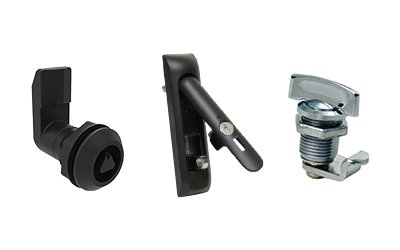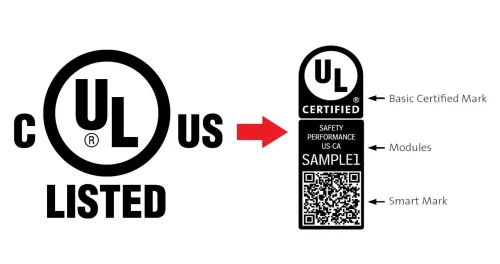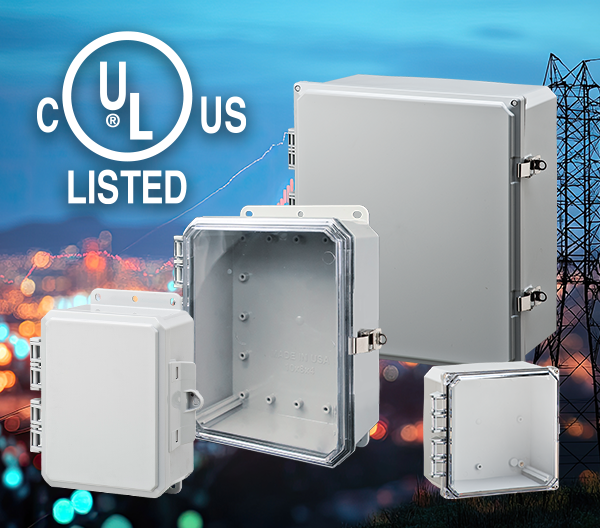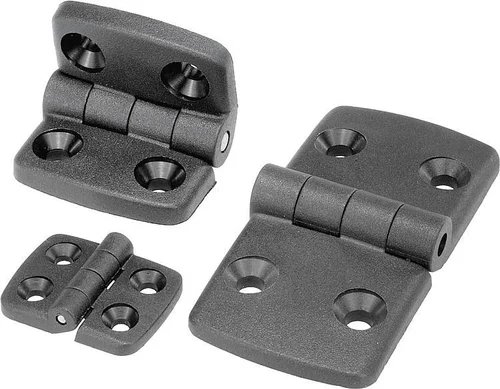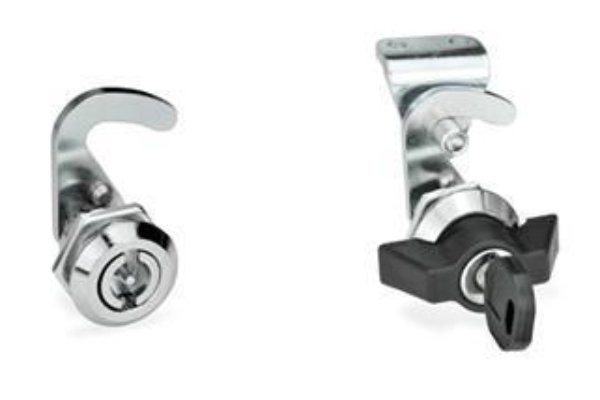As the popularity of recreational vehicles (RVs) continues to rise, driven by consumers’ desire for freedom, travel, and adventure, RV manufacturers are finding that robust security and functionality are key selling points in the industry. Modern RVs are more than just vehicles; they serve as mobile homes and safe havens for travelers, families, and adventurers. For this reason, the need for secure, reliable, and durable locking solutions has become a crucial component in RV design and production.
Industrial locks provide the security, versatility, and durability that RVs require, ensuring that occupants’ belongings and privacy are safeguarded while enhancing the overall functionality of the vehicle. From main entry doors to storage compartments and service hatches, each part of an RV can benefit from specially designed locks that can withstand frequent use, harsh weather conditions, and potential security threats.
This guide explores the different types of industrial locks ideal for RV manufacturing, outlines the benefits they provide, and offers insight into selecting, installing, and maintaining these critical components. By integrating high-quality industrial locks into RV production, manufacturers can improve the safety, durability, and market appeal of their products, ultimately leading to greater consumer satisfaction and loyalty.
2、Key Security and Functional Needs in RVs
To design RVs that meet the security and usability needs of customers, manufacturers must address several essential considerations. Industrial locks play a pivotal role in ensuring that each aspect of an RV, from personal privacy to storage security, meets industry standards and consumer expectations.
2.1 Protection of Occupants and Personal Belongings
RVs often carry a variety of valuable personal belongings, including electronics, outdoor equipment, and travel essentials. Unlike traditional homes, RVs are more exposed to external risks as they travel to various locations, including campsites, rest stops, and remote areas. Quality industrial locks provide the security needed to protect these valuable items, deterring potential theft and giving users peace of mind wherever they go. Manufacturers can emphasize the security features of robust locks, enhancing the appeal of the RV for customers who prioritize safety.
2.2 Privacy and Peace of Mind
RVs serve as both a mode of transport and a private living space, and occupants rely on effective locks to safeguard their privacy. Industrial locks not only help create a secure environment but also provide a sense of comfort for families, couples, and solo travelers alike. With reliable locks on entry doors, interior spaces, and critical compartments, manufacturers can build RVs that ensure personal privacy and help users feel safe and protected in unfamiliar environments.
2.3 Reliable Access Control Solutions for RV Compartments
An RV consists of numerous compartments and storage areas that serve different purposes, from holding travel essentials to accessing important vehicle components. Industrial locks with reliable access control mechanisms allow owners to securely store belongings and provide peace of mind that compartments are safely locked during transit. Additionally, high-quality locks prevent unwanted tampering or damage to service hatches and access panels. For manufacturers, providing reliable locks across different RV compartments ensures enhanced durability, lower maintenance, and improved customer satisfaction.
3. Types of Industrial Locks Ideal for RV Manufacturing
Selecting the right type of lock for each application within an RV is essential for ensuring security, usability, and durability. Different areas of an RV require specific lock types that suit the function and accessibility needs of that compartment. Here’s a breakdown of the most suitable industrial locks for various parts of an RV, each offering unique benefits for manufacturers and end users alike.
3.1 Compression Locks
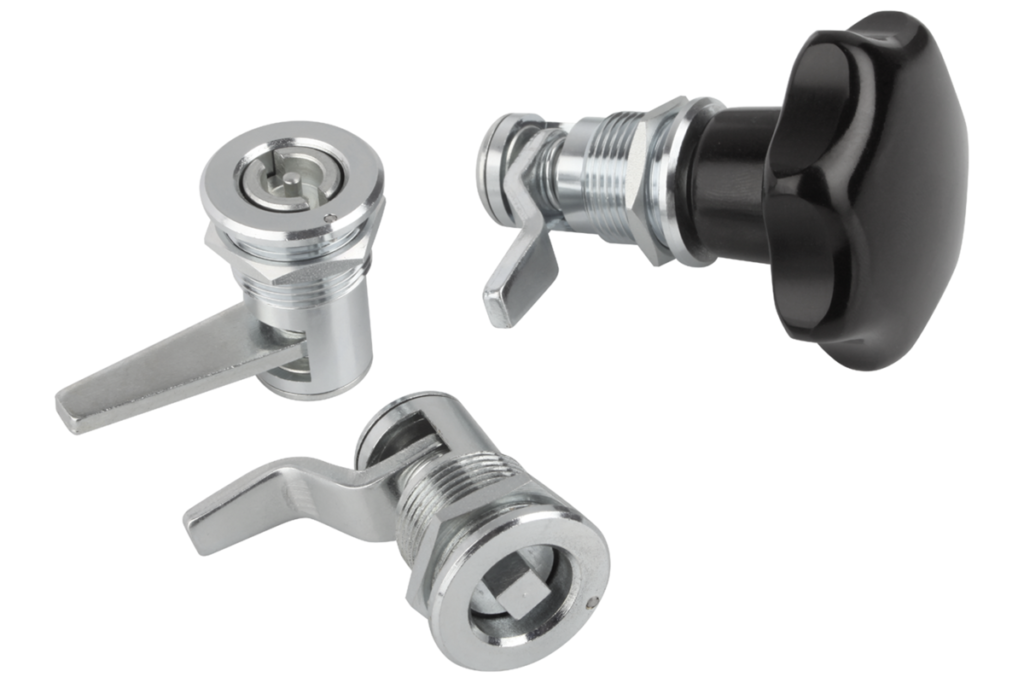
Compression locks are widely used for external compartments, access panels, and hatches on RVs. These locks are specifically designed to provide a firm, compression-style closure, making them highly effective at sealing doors and compartments against dust, water, and other environmental elements. Compression locks are particularly valuable for storage areas and compartments that house essential RV systems, ensuring that these areas remain secure even during travel. For manufacturers, compression locks can improve the overall durability and reliability of RVs, which appeals to customers who prioritize weather-resistant features.
3.2 Cam Locks
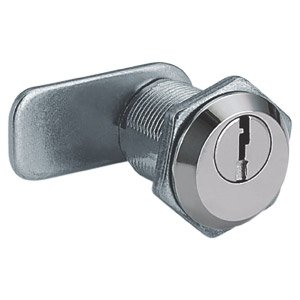
Cam locks are simple yet versatile locking mechanisms often used for interior compartments like cabinetry, closets, and small storage spaces within an RV. These locks are easy to operate, secure, and relatively inexpensive, making them an ideal choice for interior compartments that require basic security. By equipping RV interiors with cam locks, manufacturers can enhance functionality without adding unnecessary complexity. Cam locks also provide RV owners with convenient access to their belongings while maintaining the security of smaller compartments.
3.3 Slam Locks
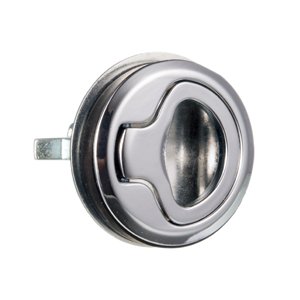
Slam locks are ideal for compartments and doors that require frequent access, as they automatically lock when closed. These locks are popular for compartments that need to stay secure during travel, such as external storage areas, tool compartments, and service access panels. Slam locks are beneficial for both manufacturers and end users, as they streamline the locking process and reduce the chances of compartments accidentally being left unlocked. Incorporating slam locks into RV design enhances ease of use and ensures that critical areas are securely closed after each use.
3.4 Deadbolt Locks
Deadbolt locks are among the most secure types of locks available and are commonly used for RV entry doors. They offer strong resistance to forced entry and are favored for their durability and reliability. In an RV context, deadbolt locks provide the primary line of defense for occupants, securing the main door and ensuring that only authorized individuals can access the living space. By using industrial-grade deadbolts for entry doors, manufacturers can deliver an RV that meets high-security standards, appealing to customers who prioritize personal safety.
3.5 Paddle Latches and Handle Locks
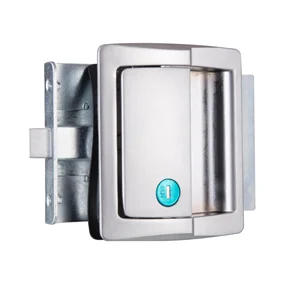
Paddle latches and handle locks are frequently used for exterior doors, including side compartments, garage spaces, and access doors. These locks are durable and easy to operate, providing RV owners with quick access to storage spaces while ensuring secure closure. The combination of handle and lock in a single unit adds convenience, especially for storage areas where users need frequent access. For RV manufacturers, paddle latches represent a functional and visually appealing option that adds both practicality and durability to the vehicle’s design.
3.6 Electronic and Keyless Locks
With the rise of smart technology, electronic and keyless locks have become increasingly popular for modern RV models. These locks offer convenient, code-based entry, allowing users to access their RV without needing a physical key. Some electronic locks even integrate with mobile devices for remote access. For manufacturers looking to appeal to tech-savvy consumers, keyless locks offer an opportunity to incorporate advanced security features into their RV models. By including electronic locks as an option, manufacturers can increase the market appeal of their RVs, especially for customers seeking a more modern and convenient experience.
4. Advantages of Using High-Quality Industrial Locks in RV Production
Investing in high-quality industrial locks during RV manufacturing brings multiple benefits, from enhanced security and durability to a stronger brand reputation. For RV manufacturers, selecting the right locks can be a key differentiator, setting their products apart in a competitive market. Below are some of the primary advantages of using reliable, industrial-grade locks in RV production.
4.1 Enhanced Security for Consumers
High-quality industrial locks provide superior security, which is a significant selling point for consumers. With increased protection against break-ins and tampering, these locks help RV owners feel secure, even when parked in unfamiliar or remote locations. Reliable locks also deter potential thieves, safeguarding the belongings stored within the RV. By using advanced locking systems, manufacturers can emphasize security as a key feature, appealing to customers who prioritize personal safety and asset protection.
4.2 Durability and Longevity
Industrial locks are designed to withstand rigorous use and last longer than standard locks. Given the unique needs of RV owners, who often encounter various environments and climates, the durability of industrial locks is especially valuable. These locks are typically made from materials like stainless steel, zinc alloys, and corrosion-resistant metals that endure wear and tear over time. For manufacturers, the use of durable locks can reduce warranty claims and maintenance issues, enhancing customer satisfaction and brand loyalty.
4.3 Weather Resistance and Corrosion Protection
RVs are frequently exposed to harsh outdoor conditions, including rain, humidity, dust, and extreme temperatures. Locks that lack proper weatherproofing are susceptible to rust, corrosion, and malfunction, leading to compromised security. Industrial locks are built with weather-resistant materials and finishes, making them ideal for RV exteriors. By using locks that resist corrosion and maintain functionality over time, manufacturers can ensure their RVs are equipped to handle the elements, increasing the vehicle’s overall resilience and customer confidence in the product.
4.4 Customization for Different RV Models
The flexibility of industrial lock designs allows manufacturers to choose specific locks that match the unique requirements of different RV models. Whether an RV needs simple cam locks for interior cabinetry or high-security deadbolts for entry doors, manufacturers can select from a range of lock types to fit the exact needs of each compartment. This customization option means that manufacturers can enhance both the security and functionality of various RV features, optimizing each model for its intended market and use case.
4.5 Improved User Experience and Convenience
Modern industrial locks, especially those with keyless and electronic options, significantly improve user experience by offering convenience and ease of access. For example, slam locks allow easy closure without manually locking each time, while electronic locks provide keyless entry options. These features simplify daily use for RV owners, making the vehicle more appealing. By integrating user-friendly lock options, manufacturers can position their RVs as accessible and convenient, attracting a broader range of consumers, including tech-savvy and family-oriented customers.
5. Key Considerations for Selecting Industrial Locks in RV Manufacturing
Choosing the right locks for RV manufacturing requires a careful evaluation of factors like durability, security, and ease of use. Since each type of lock plays a specific role within the RV, understanding these considerations can help manufacturers make informed decisions that optimize both the security and functionality of their products.
5.1 Material Quality and Durability
One of the most critical aspects of selecting industrial locks for RVs is the quality of materials used. Locks made from high-grade materials like stainless steel or zinc alloy offer enhanced resistance to wear, rust, and corrosion. Locks on RV exteriors, in particular, should be constructed from materials that withstand various weather conditions and resist corrosion, ensuring long-lasting security. By choosing durable materials, manufacturers can improve the overall reliability and lifespan of their RVs, reducing the likelihood of lock failures and enhancing customer satisfaction.
5.2 Lock Mechanism Selection Based on Application
Different parts of an RV require specific lock mechanisms to meet unique needs. For instance, compression locks work well for exterior compartments that need to remain sealed against water and dust, while deadbolts are essential for main entry doors to maximize security. Cam locks, on the other hand, are ideal for securing interior cabinetry, while slam locks provide easy, secure access to frequently used compartments. By selecting lock mechanisms that align with the functionality of each RV compartment, manufacturers can improve both usability and security, making the RV more attractive to consumers.
5.3 Weatherproofing and Environmental Adaptability
Weatherproofing is a crucial factor in RV manufacturing, as these vehicles are constantly exposed to outdoor conditions. Locks should be designed to withstand rain, humidity, extreme temperatures, and dust, ensuring that they function reliably over time. Corrosion-resistant finishes and seals are particularly valuable for exterior locks, as they prevent rust and maintain lock integrity. Choosing locks with proven weather resistance reduces maintenance requirements and adds value to the RV, making it more appealing to buyers looking for durability in various climates.
5.4 Ease of Installation and Use
Lock installation is an important consideration in RV manufacturing, as efficient installation processes can save time and reduce production costs. Locks that are easy to install and operate streamline the manufacturing process, minimizing delays and allowing for greater productivity. Additionally, locks that offer intuitive operation improve the user experience for RV owners, who benefit from ease of access and reliable functionality. Manufacturers should aim for locks that combine straightforward installation with user-friendly operation, ensuring that both the assembly team and the end customer benefit.
5.5 Keyed vs. Keyless Options for Consumer Flexibility
Keyed and keyless locks each offer distinct advantages depending on the needs of the RV owner. Keyed locks are often preferred for high-security applications, providing a tangible key for accessing specific compartments. However, keyless options, including electronic and code-based locks, are growing in popularity due to their convenience and ease of use. Manufacturers can cater to different customer preferences by offering both keyed and keyless options, allowing consumers to select locks that best match their lifestyle and security requirements.
5.6 Brand Reputation and Support Services
When sourcing locks for RV manufacturing, selecting brands with strong reputations for quality and customer support can enhance the reliability of the final product. Trusted brands are more likely to provide high-quality components, warranty coverage, and technical support, ensuring that manufacturers can rely on their products to perform as expected. Building relationships with reputable lock suppliers also provides manufacturers with the assurance that they’re using dependable components, which translates into higher customer satisfaction and reduced service issues post-sale.
6. Installation and Maintenance Best Practices in Manufacturing
Proper installation and maintenance are critical in ensuring that industrial locks function effectively throughout the life of the RV. By following best practices during the manufacturing process, manufacturers can improve the reliability and durability of their locks, reducing post-sale service issues and enhancing customer satisfaction. Here are some key practices to consider for efficient installation and maintenance of locks in RVs.
6.1 Simplifying the Installation Process
Efficient installation processes are essential to streamline RV manufacturing and avoid production delays. Choosing locks that are straightforward to install can save time and reduce labor costs. Here are some best practices for simplifying lock installation:
- Pre-assemble Lock Components: Pre-assembling components before installation can help save time during assembly. For example, fitting cam locks into cabinetry or pre-installing paddle latches can reduce installation complexity.
- Use Standardized Tools: Select locks that require common tools for installation. This minimizes the need for specialized tools, reducing the potential for delays and errors.
- Provide Installation Training: Training assembly teams on the specific installation requirements of each lock type can prevent mistakes and ensure consistent quality across production.
6.2 Maintenance Recommendations for End Users
Educating end users about maintenance is an effective way to extend the life of RV locks and prevent malfunctions. Providing simple maintenance guidelines can help RV owners keep their locks in optimal condition. Manufacturers can include these tips in the user manual:
- Regular Cleaning: Recommend periodic cleaning of lock components, especially for external locks exposed to dirt and weather elements. A damp cloth or mild detergent can help remove debris and maintain functionality.
- 윤활: Suggest light lubrication (e.g., silicone-based sprays) for moving parts, such as lock cylinders, to prevent wear and ensure smooth operation. Remind users to avoid over-lubricating, as excess oil can attract dust.
- Check for Rust and Corrosion: Encourage owners to inspect locks periodically, particularly on exterior components. Early detection of rust or corrosion allows for timely maintenance, preventing further deterioration.
6.3 Troubleshooting Tips for Common Lock Issues
Despite high-quality lock installations, minor issues can arise over time due to factors such as weather exposure or wear. Providing RV owners with troubleshooting guidance can empower them to resolve minor issues without needing professional assistance. Some common lock issues and solutions include:
- Key Jamming or Stiff Locks: Recommend that users apply a small amount of graphite powder or silicone spray to the keyhole if they experience difficulty turning the key. This can help reduce friction and prevent further issues.
- Rust or Corrosion on Exterior Locks: If rust appears, users can use a rust remover or a wire brush to gently clean the affected area. For locks prone to corrosion, applying a rust-resistant spray can offer additional protection.
- Misalignment: If locks become misaligned due to frequent use, suggest that owners check the alignment of screws and mounting hardware. Tightening screws can often realign the lock, restoring its proper function.
By implementing these installation and maintenance best practices, manufacturers can reduce service requests, minimize warranty claims, and improve the longevity of locks within their RV models. These steps not only benefit RV manufacturers by reducing post-sale issues but also enhance the end-user experience, making maintenance simple and effective.
7. Case Studies: Benefits of Industrial Locks in RV Manufacturing
Real-world examples highlight the advantages of using high-quality industrial locks in RVs and demonstrate how these locks enhance the functionality, security, and marketability of RV models. The following case studies illustrate specific benefits, from increased consumer appeal to reduced maintenance needs, that RV manufacturers have achieved by incorporating industrial-grade locks.
7.1 Case Study 1: Enhancing Security and Market Appeal
A well-established RV manufacturer aimed to improve the security features of their mid-range and premium RV models to better appeal to customers concerned about safety. By partnering with TriMark and integrating high-quality deadbolts on entry doors and compression locks on exterior storage hatches, the manufacturer significantly enhanced the security of their vehicles. This upgrade allowed the manufacturer to highlight “enhanced security” as a selling point, positioning their RVs as a safer choice for customers who prioritize protection while traveling. The result was an increase in sales, as buyers responded positively to the added security features.
7.2 Case Study 2: Cost Savings with Durable Lock Solutions
A manufacturer specializing in off-road RVs faced frequent customer complaints regarding corrosion and lock malfunctions due to extreme weather exposure. In response, the company began using Southco’s weather-resistant compression locks and stainless steel cam locks, which were specifically designed to withstand challenging environments. These durable lock solutions reduced the frequency of warranty claims and maintenance costs, ultimately leading to significant cost savings. The manufacturer was able to advertise the locks as “built for extreme conditions,” which helped attract customers interested in off-road adventures and contributed to improved customer satisfaction.
7.3 Case Study 3: Adapting to Consumer Demand for Smart Features
With an increasing number of consumers seeking smart technology in RVs, a leading manufacturer decided to incorporate keyless entry systems into its luxury RV line. The company chose Bauer’s NE Keyless Entry and AP Products’ electronic locks for the main entry doors and high-use compartments, offering customers a more convenient and modern experience. The keyless entry feature allowed RV owners to access their vehicle without needing a physical key, adding a layer of convenience that was highly appealing to tech-savvy customers. This innovation attracted a new customer demographic and positioned the manufacturer as a leader in smart RV technology, ultimately leading to increased demand for their products.
8. Future Trends in RV Lock Technology
As technology advances, RV lock systems are evolving to offer enhanced security, convenience, and functionality. These emerging trends are poised to influence the RV manufacturing industry and provide manufacturers with new opportunities to differentiate their products. Here’s a look at the trends likely to shape the future of RV lock technology.
8.1 Smart Locks and Connected Features
The rise of the Internet of Things (IoT) has led to the development of smart locks that can be remotely monitored and controlled via smartphone apps or centralized control systems. For RV owners, these connected locks allow for remote access control, enabling them to lock or unlock their vehicle even when they’re away. Smart locks can also provide real-time notifications, alerting owners if unauthorized access is attempted. For manufacturers, integrating smart lock options can enhance the appeal of RV models, especially for tech-savvy customers who prioritize security and convenience. As connectivity becomes more widespread, these smart locking systems are likely to become a staple feature in luxury and high-end RVs.
8.2 Biometric and Keyless Entry Advancements
Keyless entry options are increasingly popular in the RV market, with advancements in biometric technology making these systems even more secure and convenient. Biometric locks, which use fingerprint or facial recognition, offer a level of personalized security that traditional locks cannot match. These locks eliminate the need for physical keys or keypads, simplifying access for RV owners and adding a high-tech touch to the vehicle. As biometric technology becomes more affordable, RV manufacturers may find it appealing for high-security applications, such as main entry doors or high-value storage compartments, providing an additional selling point for modern RV models.
8.3 Enhanced Materials and Durability
Advancements in materials science are leading to the development of even more durable locks, with materials that offer better resistance to wear, weather, and corrosion. New coatings and alloy blends are being designed to withstand extreme conditions, from salt spray exposure to fluctuating temperatures, making these locks ideal for off-road and all-weather RVs. As consumers demand more rugged and reliable products, manufacturers can stay ahead by adopting locks made from these advanced materials, enhancing the longevity and reliability of their RV models. This trend is particularly relevant for brands that target adventurous customers who frequently travel to challenging environments.
8.4 Integration with Centralized Control Systems
Future RVs are likely to feature centralized control systems that allow owners to manage multiple vehicle functions from a single interface, such as a touchscreen panel or mobile app. By integrating locks into these systems, manufacturers can offer a unified user experience where owners can control locks, lighting, heating, and other features in one place. This integration can improve convenience and security, as RV owners can check and control lock status with ease. For manufacturers, offering a cohesive control system that includes lock management can enhance the appeal of high-end models and create a more connected, seamless experience for RV users.
8.5 Sustainable and Eco-Friendly Locking Solutions
With environmental awareness on the rise, there is a growing interest in sustainable manufacturing practices and materials. RV manufacturers are increasingly exploring eco-friendly options, including locking solutions made from recyclable materials or locks with energy-efficient electronic components. Using sustainable materials in lock production can also enhance brand reputation and appeal to environmentally conscious consumers. As the demand for eco-friendly products continues to grow, adopting sustainable locking solutions will allow manufacturers to align with market trends while contributing to environmental responsibility.
9. Conclusion
The integration of high-quality industrial locks in RV manufacturing is crucial for creating secure, functional, and reliable vehicles that meet the diverse needs of today’s RV users. By selecting durable locks suited to specific compartments, ensuring proper installation, and considering future advancements in lock technology, RV manufacturers can significantly enhance the safety, usability, and appeal of their products.
As this guide has shown, industrial locks provide numerous advantages in RV production, from robust security to weather resistance and user-friendly operation. Additionally, emerging trends like smart locks, biometric entry systems, and sustainable materials present manufacturers with new opportunities to differentiate their RVs in an increasingly competitive market.
By investing in reliable lock solutions and staying informed about industry innovations, manufacturers can meet the expectations of modern RV buyers who value security, convenience, and cutting-edge technology. Ultimately, equipping RVs with quality locking systems not only improves the customer experience but also strengthens brand reputation and loyalty in a rapidly growing industry.

